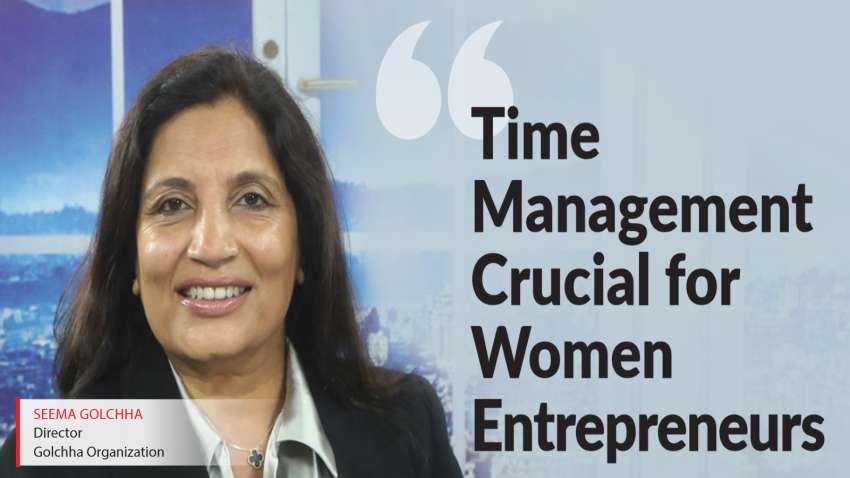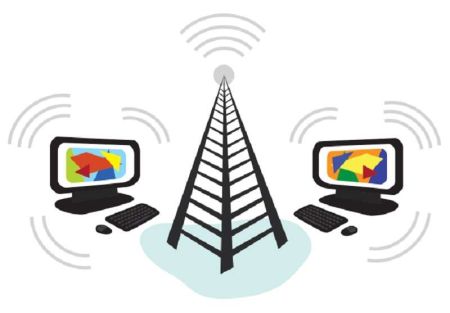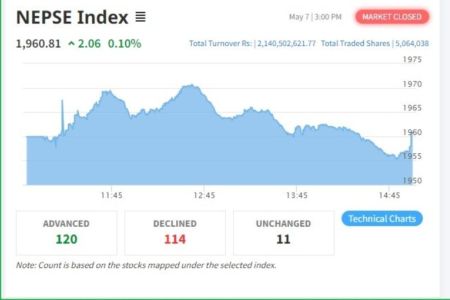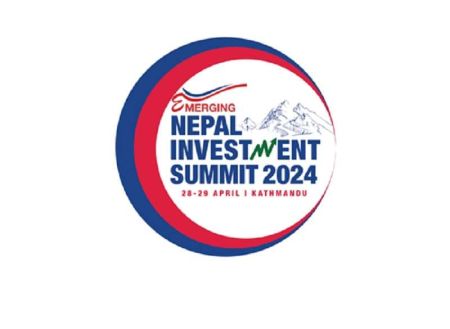Seema Golchha is the Director at Golchha Organization. She spearheads the organisation's Samsung Modern Retail Division, which encompasses 14 outlets spread across Nepal, in addition to overseeing a network of over 400 sales and after-sales points. Moreover, she serves as the Director of Switch On, a multi-brand electronics and home appliances retail establishment. She is also involved in a number of organisations working in the field of women empowerment. In an interview with Madan Lamsal, Editor-in-Chief of New Business Age, Golchha talked about professional undertakings and her contributions to society. Excerpts:
Please tell us a bit about yourself.
I grew up in India. I don't come from a business background; rather, I come from a family where education is given a lot of emphasis. Both of my parents were postgraduates and working at that time. My mother especially emphasised the importance of building a career, a dream that was instilled in me from childhood. I studied at Delhi University and pursued further education in marketing and PR in Delhi as well. Subsequently, I began my career in India. Even before getting married, I was already working, but the aspiration to achieve something even after marriage was always present. I met my husband, Shekhar, at Delhi University when we were both quite young. After approximately six and a half years of being together, we tied the knot. Back then, there were very few women from the Marwari community pursuing endeavours beyond the traditional roles.
What were the turning points in your business or career?
I was brought up in a very different atmosphere where I was given a lot of freedom. Freedom, in a sense, in decision making. When I got married, there were a lot of changes. I will not say just my family, but traditionally the families were different, Kathmandu itself was different, society was different. Women were not so empowered. I had to face a lot of problems. Then over the period of time, we overcame the challenges. Once I started my work, everything changed. Luckily for me, my father in law supported me throughout. He was my biggest support and my strength. Since he was a very well travelled man, who had gone all over the world, he knew the situation, how women are advancing, how women are changing outside. He supported me and with that I started my own work.
You have also been working also in the field of women and empowerment. You are also the IPP of Zonta Club of Kathmandu. What are your observations regarding the status of women in general and women entrepreneurship in particular?
Zonta is very close to my heart. When it comes to women empowerment, I am very emotional about certain things. I have seen my mother as an empowered woman. I guess I grew up in that atmosphere. At Zonta, our focus lies in advocating for women's rights with emphasis on education. We put a lot of focus on educating girl children and fostering economic empowerment. I personally feel that once you are economically empowered, you have a better understanding, a better decision making and people listen to you because you are the bread earner of the family. If not you are the earner, you're contributing. So your status in the family changes. Through Zonta, we try to give training that enables women to be more economically empowered. When women earn money, they spend it on their children's education or for their children's future. So that money is very well utilised.
When I was the president of Zonta, we adopted a village in Chandragiri Municipality. We trained the local women in community farming capitalising on their existing knowledge of small-scale farming. From the money they made, they built their own greenhouse and engaged in tomato farming. We also started an adult literacy program in Madhesh Province. We found women who could not even write their own name. Once they started reading and writing, the confidence in them developed. We have also provided self defence training to young girls in schools so that they are confident when they are travelling alone or if they are in public spaces.
Please tell us more about Zonta Club of Kathmandu?
The Zonta Club of Kathmandu was established approximately 10 years ago in Nepal. When we say we have educated about 300 women, it doesn't specifically say 300 because they go home and teach their mothers and grandmothers also. One of the club's key focuses has been adult literacy, which we have successfully implemented in around 12 schools. Likewise, we have built 32 toilets as we had been hearing girls leaving school due to inadequate toilets. I cannot exactly say how many girls have benefited because even female teachers have been using these facilities.
During the challenging times of the COVID-19 pandemic, we organised online training for students at Durbar School. Everybody was talking about online education at that time. Of course private schools could do it, but what about government schools? They did not even know what online education was. First we trained teachers to teach using laptops, and then distributed smartphones to students.
Although we receive requests for our programs, we prioritise collaboration and coordination with local organisations that have an established presence in the areas we wish to assist. For instance, we partnered with Teach for Nepal, a significant educational organisation working across various schools. We wanted to distribute bicycles to girls in Chitwan to facilitate their attendance at school. Since we didn't know which school to go to and which girl is in need of bicycles, we took the help of Teach for Nepal. We do this to ensure that our time and resources are utilised effectively.
Is Golchha Group doing something specific towards women entrepreneurship under CSR or other activities?
While our focus hasn't been solely on women, Golchha Group has been actively engaged in various CSR endeavours. We were the first ones to support Teach for Nepal. Additionally, we are associated with a disability orphanage located near Kathmandu.
When Samsung Plaza celebrated its 15th anniversary; we extended our support to girls' schools and sponsored the education of 50 girls for a year.
We have always believed in youth because youths are our future and we believe this is where our investments should be directed. This year, we are proudly serving as one of the title sponsors of Glocal Teen Hero, recognising that today's youth will shape the destiny of our nation. This overarching theme of youth remains consistent across various initiatives, such as the Pulsar Sports Awards, Glocal Teen Hero, and Teach for Nepal.
While CSR might not be obligatory for private enterprises, we have voluntarily undertaken these efforts for many years due to our strong conviction in their value.
It is said that the digital era holds good prospects for women entrepreneurship. So what prospects and what challenges do you see in this digital era?
Digital era is here, and it’s here to stay. It’s a big revolution. We were going for it, but I think COVID expedited the pace. The speed has become faster because people have realised how life can be and how the net can connect each other. I strongly believe in the digital revolution and I think we should be a part of it. I think 52% of the population has Internet access. This gives a strong chance for women to come up because the digital revolution is that you are equal. So you can work here, you can learn, you can take any kind of training from the comfort of your home. However, it is essential to acknowledge that in Nepal, digital platforms have predominantly been utilised for entertainment, with TikTok and Facebook occupying significant space. The tools at our disposal facilitate unprecedented connectivity, effectively bridging geographical divides. Today, an individual in Humla can effortlessly connect with another in Hetauda. We need to harness this advantage. I think we need more support from the government so that many startups can come up.
What challenges exist in enhancing women's digital literacy on various platforms?
I think service providers have a notable role to play. Affordable and widespread access is vital to empower women effectively in the digital realm. Improving pricing structures and expanding availability are essential aspects in this endeavour. Furthermore, the realm of cybercrimes, particularly concerning online payments, is another challenge. Therefore, educating women about the potential risks linked with digital transactions becomes imperative. Guiding them through secure payment methods and raising awareness about the possibility of platform misuse stands as a crucial aspect of their education.
How can support be extended to women engaged in micro and small businesses?
When we talk about small businesses, I think they definitely need some guidance and support initially. Once they learn all these things, they need a lot of support. There are various groups and organisations who are ready to support them. The main thing required is confidence. When a woman comes out from a house, she has to prove herself. A man does not have to pass through all these. A woman commencing a venture has not only to convince her family of her potential but also to assert herself in society. That is why I feel they need a lot of support. There are different government agencies, and a lot of UN agencies who can help provide needful support and help them become independent.
When it comes to time management, it’s the same for the corporate women and the village women. This truth resonates with me personally.The moment I reach home I should know everything - what food is to be made if the guests are coming, what is on the menu, how the table has to be set up etc. No matter how empowered we tell ourselves, this is the situation.
But having said that, digitalisation helps a lot. I read in news reports during COVID that there was a group of women in India who were supplying basic food to students - just rice, lentils and vegetables. The business grew so much that today they have started a catering service. What I am trying to say is that we should seize opportunities. But you will need confidence and some support.
What obstacles, in your opinion, still persist for women entrepreneurs?
From my personal experience, I have never perceived any hindrance solely due to being a woman. Gender-based discrimination has never been a factor I've dwelled upon. As a businessperson, I have certainly encountered challenges. The current state of our economy, characterised by liquidity constraints and a surplus of inventory amid a sluggish market, is a shared struggle. I am not facing these problems just because I am a woman. The whole country in general is facing these problems.
Others may have encountered gender-related obstacles. However, I choose not to approach markets or ventures with a mindset that emphasises my gender. I won’t say I am encountering these problems because I am a woman. If I am denied something, it could well be an issue a man might also face. I believe in equality. That problem can happen to a man or a woman. On the contrary, a lot of banks offer special privileges for women entrepreneurs. Women also get discounts in fees and other benefits while registering firms in their names.
Do women entrepreneurs or professionals really need different or special treatment?
It's a challenging question to answer. In my view, let's provide them with equality in education and equal rights. Ultimately, success should be determined by merit, regardless of gender. For countless years, women have not been a part of the mainstream. The 33% reservation for women in parliament highlights the necessity to elevate their representation. To begin with, I believe women require additional support. However, once they have achieved parity, they should be treated as equals. Initially, their journey might necessitate assistance due to the difficulties they face in entering and establishing themselves in the market.
When I entered the business world roughly 22 years ago, there were scarcely any women, particularly in the corporate sector. Female presence was minimal, with a few exceptions in the banking industry. But in the corporate world, I did not see any.I vividly recall attending meetings where I was often the sole woman, occasionally joined by three or four others in total. There were only men. But not anymore. Today, women don't feel out of place in such meetings, as they are surrounded by peers. There's no longer a need for women to fight for their right to work. In many business schools, the number of female students surpasses that of male students. But I don't know where they disappear after education because you don't see as many women as men in the corporate world. The business sector has changed a lot over the years. There are a lot of enterprising and enthusiastic women who are eager to participate in the corporate arena. This positive change is promising, but we still have miles to go.
As a businesswoman, what advice do you have for women who aspire to be entrepreneurs or for existing women entrepreneurs seeking to balance family and career?
My advice would be not to be afraid of taking risks. When you enter this world, you're bound to encounter tough times. Instead of fearing them, embrace these challenges. They're an integral part of the journey. Effective time management will be crucial. Begin your day early – I wake up at 6:00 am, complete my morning exercise routine, and then head to the office. Family responsibilities are always present. When my children were young, I juggled those alongside my other commitments. Currently, our children are grown, relieving me of some of those responsibilities. An important lesson I've learned is that I'm not a superwoman. There's no need to prove yourself to anyone. At times, women tend to proclaim themselves as the best mother, daughter-in-law, or professional in the corporate world. My suggestion is to simply be yourself and fulfil your duties. It's okay to stumble; after all, we're only human. When I began working a decade ago, stress was a constant companion. I felt that I hadn't accomplished everything I wanted. I even missed my daughter's parent-teacher meetings due to corporate commitments. But that's alright; those moments were outweighed by my professional responsibilities. It doesn't mean I love my daughter any less. Nowadays, I handle such situations with ease. I've attained a sense of calm and collectedness.
What are Golchha Organisation's future plans in terms of expansion?
I believe the organisation's growth would stall without expansion. While I might not be able to disclose specifics at this moment, you'll soon witness it firsthand. Golchha Group is making substantial investments in various areas. We are currently observing the developments and analysing the market dynamics. Expansion is a fundamental aspect of our strategy. My son now oversees a major portion of the business, and my daughter-in-law is actively involved as well. This has set the stage for many upcoming initiatives.






















